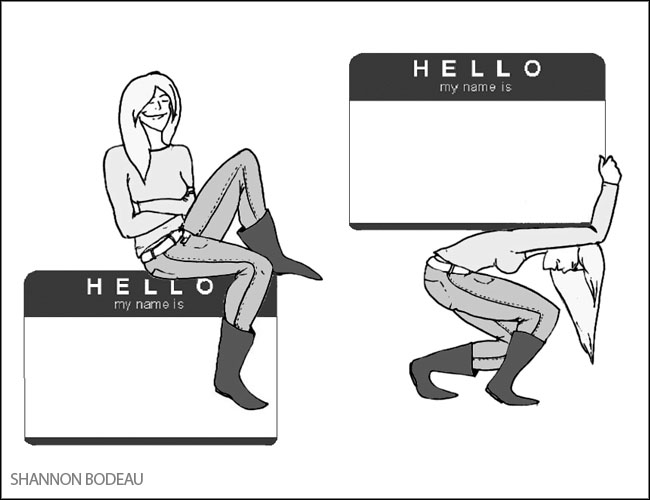
Names superficially help serve the purpose of identifying one person from another, but ultimately become a part of one’s identity. Names hold particular significance to people for they have been associated with them for all their life. Then, as they grow older, behind the name is the history of how they’ve been treated, the reputation they’ve developed, and the experiences and feelings that make them who they are.
Names are directly about family history and personal meaning. But if a name comes pre-labeled with specific memories and feelings, can it limit a person’s ability to shape it to themselves? Many people feel that a name can hold them down and determine their future luck in life.
Maybe people have a chance to determine their name’s significance by how they act under that name. Freshman Stephen Schick suggests, “Well I think a name can describe somebody’s personality, I’ve grown around my name, I feel that, so I guess people adapt to names.”
“I think a name can really define who a person will become,” says freshman Shannon Thielen.
Senior Billy Seeburger agrees that a name sets a certain path, saying “People become their names.”
Yet, junior Gordon Straughn says, “I don’t think names hold people down unless they’re associated with a bad reputation.”
Junior Wyatt Cooper agrees, adding “I think the person ultimately shapes that name for themselves when they grow up, or changes it if it’s just too unsuitable.”
Some people yearn to change their names. “When a person changes their name, they may feel that they get a clean slate and it’s an opportunity to start over. They may feel that it’s easier to let go of negative experiences in the past and move forward,” says Thielen
Cooper adds, “If a name just doesn’t match up with a person or doesn’t agree with them, then I think it could be relieving for them to get rid of it. A name carries so much about your identity that I think getting rid of it could free yourself.”
Seeburger proposes a different perspective, “[Names] only cause some people to work harder to prove themselves than others,” he counters. “Changing names are only for people who are weak and cannot handle their past.”
“I think a name is a name, it describes you, it can show who you are, but I don’t think it really would affect you luck-wise”, Schick agrees. “If you don’t like it, change it. But I don’t think it affects your personal life.”
In modern day society, people have many outside sources, such as the media, affecting their opinions. For example, one can often more easily imagine a popular cheerleader named Jessica than a popular cheerleader named Gertrude. Even without a clear appearance or personality behind a name, a certain amount of stereotypical baggage comes along with it.
“I think that just like anything else that people instantly learn about someone, it affects how they view that person. Especially when you are first meeting someone, you don’t have much other information on which to judge them, so somebody’s name can definitely affect how people see them,” Thielen elaborates.
Schick agrees, offering his own outlook, “People develop a biased opinion or a negative opinion, around you just because of your name. They develop an opinion before they know you, because of your name, “ he says.
First impressions are crucial, whether good or bad they set up a mindset that is hard to change. When people first see a name, they subconsciously gain an expectation of who the person behind that name might be. Names can even discriminate, as they separate people from each other and can even bring a group of people together.
“Names definitely can separate people and bring people together, when I introduce myself my last name is Schick, people assume it’s German and they can relate and we can have a conversation about our heritage,” says Schick.
“I definitely think that people get a first impression from just looking at a name. Like, it would be expected for people with similar ethnicity ethnic names to be brought together by it” says Cooper.
Overall it seems that people adapt to their names as names adapt to people. It all depends on the mindset. Still, names aren’t completely neutral, every name comes with it’s own expectations and own standards; it’s the person’s job to morph their name into something that suits their personality



